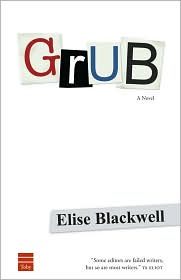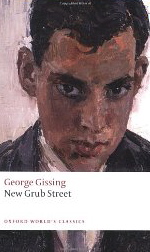“Hey, did you hear the one about the writer who died? St. Peter offers him the option of heaven or hell and the writer asks to see each one before deciding. As they descend into the fires of hell, the writer sees row upon row of writers, all chained to their steaming-hot desks and being whipped by demons. ‘Show me heaven,’ the writer says. They ascend to heaven and there’s row upon row of writers chained to steaming-hot desks and being whipped by demons. ‘But it’s just as bad as hell,’ the writer says. St. Peter shakes his head, and says, ‘No, because in heaven your work gets published.”–from Grub
Casting a satiric eye on the publishing business, author Elise Blackwell shows the agonies and excitements of several young authors as each tries to find the magic formula for getting a book published, publicized, and sold to the public. Most have been successful with a first novel—at least to the extent that it has been published—and all now have second novels which they are trying to “place” with a publisher. Trying to support themselves with contributions to small literary journals while looking for the “right” connection for their next novel, they must negotiate literary minefields filled with agents, editors, publicists, manuscript “fixers,” sponsors of writing conferences, and influential bookstore chains, all of which affect their sense of mission and, ultimately, their self-worth.
satiric eye on the publishing business, author Elise Blackwell shows the agonies and excitements of several young authors as each tries to find the magic formula for getting a book published, publicized, and sold to the public. Most have been successful with a first novel—at least to the extent that it has been published—and all now have second novels which they are trying to “place” with a publisher. Trying to support themselves with contributions to small literary journals while looking for the “right” connection for their next novel, they must negotiate literary minefields filled with agents, editors, publicists, manuscript “fixers,” sponsors of writing conferences, and influential bookstore chains, all of which affect their sense of mission and, ultimately, their self-worth.
Following Jackson Miller, the son of wealthy parents who disowned him when he became a writer, Eddie Renfros and his wife Amanda, and Henry Baffler, all of whom have known each other for years, the novel also includes their lovers and friends—writers all, though some of them write secretly. As they get together and share their successes and failures, their attitudes toward writing and their craft become obvious. Jackson, for example, decides on the “commercial” route, stating that “If I had it in me, I’d write the trashiest of trashy novels…I’d sign my name proudly.” Eventually, he announces, “I’m gearing up to write a vapid book that appears to be smart,” which he describes as “a tale of greed and drugs but mostly sex on Wall St.,” a book tentatively entitled Pig-Male-Ion.

Eddie Renfros wants to be true to his craft. When his agent informs him that his completed novel may be “too quiet,” Eddie argues that “There’s a plane crash, death, adultery, bribery, surgery on a child’s ear, a world premiere, a drunken cellist, and a beautiful shameless slut of a violin player.” In the wonderful, darkly humorous scene which follows, the two argue about his prospects for success. His agent believes she can sell the book, though maybe not to a mass market publisher—”A lot of educated women could want to read it. If nothing else, they’ll think they’re learning something about classical music. And the violin slut is good, particularly that one scene. Heterosexual sodomy is very in…” She believes that he is a “boutique writer,” whose novel will sell by word of mouth and by hand selling, but “I don’t want your expectations to be too high. This isn’t an auction project…I know you’re not in it for the money.”
Eddie’s wife Amanda, however, is tired of supporting her husband’s writing. Upwardly mobile, she absolutely refuses to leave New York for New Jersey to save money. “If I could choose between literary reputation and contemptible popularity,” she says, “I think I might take the bestseller.” Amanda soon begins to write secretly herself—under two names. “Clarice Aames” is the author of popular short stories which quickly find a huge audience in journals and among the writers she and Eddie know, while “Amanda Yule,” her maiden name, is working on a pop novel. Using the painting of Fragonard as her inspiration, she wants to create a novel “weird enough but not too weird, historical, pretty, and—this was key—full of sexual possibility.” She instantly determines to entitle it The Progress of Love, to name her heroine Libertine, and to complete the manuscript in four months.
Henry Ba ffler, a believer in the New Realism, which he has not completely defined, spends his time watching a man in the park, a court bailiff, recording every aspect of his life. Plotless but “literary,” his newest novel is having a difficult time finding either an agent or a publisher, and he is not even sure he believes in the New Realism anymore. “If it’s a book you really want to write,” he asks, “does it matter if anyone wants to read it?”
ffler, a believer in the New Realism, which he has not completely defined, spends his time watching a man in the park, a court bailiff, recording every aspect of his life. Plotless but “literary,” his newest novel is having a difficult time finding either an agent or a publisher, and he is not even sure he believes in the New Realism anymore. “If it’s a book you really want to write,” he asks, “does it matter if anyone wants to read it?”
As the reader becomes engaged in following the success or failure of the various characters and the wonderful cast of supporting characters, the author vibrantly (and mordantly) depicts the inherent conflicts between artistic success and commercial success. Blackwell’s characters are not fully developed, nor should they be, since the author’s intention is to show them primarily as writers–from various backgrounds and with various motivations and personal goals. Her depiction of their lives shows the dedication and artistic commitment of some, the naivete of others, and the crass commercialism of still others. Literary journals, writing conferences, and author tours, which involve these authors, also come under the microscope.
Though Blackwell has based this novel on George Gissing’s 1891 novel New Grub Street, her lively prose, contemporary characters, and modern conflicts show how little life has changed for the writer. Delightful, thought-provoking, and full of rapier-sharp insights into the tenuous connections between writing and publishing, the novel is assured, perceptive, and often hilarious. The glimpses Blackwell provides of the strange, literary world she inhabits are unforgettable. (On my Favorites List for 2007)
Notes: The author’s photo appears on her website: http://eliseblackwell.com
The cover of New Grub Street by George Gissing is the new Oxford World’s Classics edition, released in April 2009.
